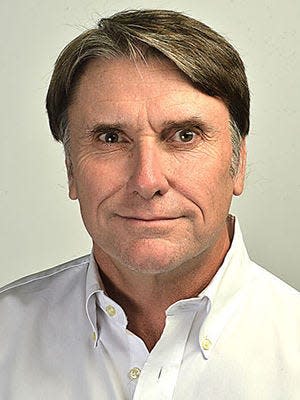Suffering from eco-anxiety and climate grief? Guess it depends on how old you are
My dad, in a rare moment of whimsy, would say that if you could keep your head while all those around you were losing theirs, it’s probably because you don’t understand the situation.
There’s a grain of truth there, because I have often been grateful that I’m not intellectual enough to be anxious. Yes, climate change is an existential threat to humanity’s existence, but — the supermarket has a sale on Doritos.
(There is also the possibility that deep down I’m not sure that the universe on average wouldn’t be better off without humanity, but that’s a whole different issue and too discouraging to think about anyway.)

But for many people, if many people can be believed, eco-anxiety and climate grief are rising to the top of the list of things Americans need to be treated for. “Eco-anxiety and climate grief are unlike other issues in psychiatry because the feelings extend to something greater than ourselves and our personal narrative,” wrote psychiatrist Emily Willow in The Washington Post.
That right there is refreshing, I’d say. Most people are wallowing too deeply in Lake Me to care what happens in Lake Mead.
Willow also practices in California, where — yikes! If you’re over 50 you probably remember that a real and ongoing fear was that any day now a great earthquake was going to open up a great fissure along the Sierra Nevada mountains and the main of California was going to slide into the sea.
Today, such a quick and conclusive end seems almost merciful.
The Northeast is starting to see its share of “climate refugees” not just from fruit and nut land, but from places like Texas, where they are trying to escape something they don’t even believe in.
There is even something called The Climate Mental Health Network whose mission is to manage the emotional impacts of climate change. But wait, there’s more. “The Climate Mental Health Network recognizes climate change and mental health as intersectional issues that are inseparable from environmental justice, women's rights, disability justice, Indigenous justice, decolonization, and anti-oppression efforts underway across the world.”
Whoa, whoa, whoa, that sounds like more than I can help by putting up a windmill. With an agenda that monumental, maybe while they’re at it they could also try to figure out what’s wrong with the Washington Commanders’ defense.
However, I don’t discount that they may be onto something. It’s easy for me to register climate change low on the worry-o-meter — I just need the planet to lurch along for another couple of decades and then I’ll be done with it. If you’re 25, things no doubt look a lot different.
Also, when milky smoke from wildfires thousands of miles away was polluting our usually pristine blue skies, I myself couldn’t help but feel a little irritable at the unfairness of it all.
Why can’t we send the smoke exclusively to states that vote Republican? I understand that petty vindictiveness is a long way from clinical depression, but for me it was a pretty strong emotional response.
Dr. Willow recommends psychedelic medicine-assisted therapy as a treatment for eco-anxiety, which sounds good to me. If it will get me into the clinic, I’ll even pretend to be more worried about global warming than I actually am.
“In my clinical practice, patients using oral ketamine plus psychotherapy have experienced breakthroughs and new insights when working with the intention of navigating eco-anxiety,” she wrote. “Many patients said they felt connected to a sense of oceanic oneness, reminding them of the meaningful interconnectedness of their lives with others and offering context for their personal narrative.”
Um, on second thought, never mind. I thought the point of drugs was to help you think less. My personal narrative has enough managing its own bad self without bringing an ocean of other people into the mix. Which is why old, unintellectual guys like me who want to help should just nail up a couple of solar panels and otherwise stay out of it.
Tim Rowland is a Herald-Mail columnist.
This article originally appeared on The Herald-Mail: Psychiatry treating those worried about effects of climate change
